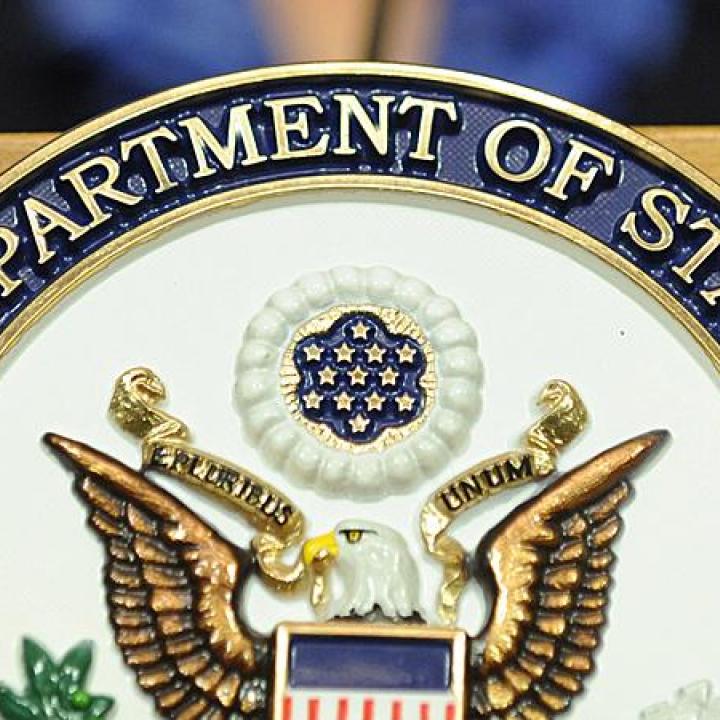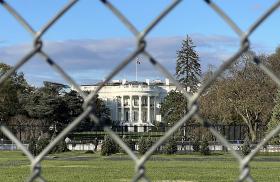
- Policy Analysis
- PolicyWatch 4071
Here’s How State Department Cuts Would Impede U.S. Policy in the Middle East

The Trump administration’s budget cuts, intended to make America “safer, stronger, and more prosperous,” could wind up harming U.S. interests in the region while strengthening Russian and Chinese media warfare.
At a time when the Middle East needs additional help managing the fallout from the war with Iran, the extreme State Department budget cuts initiated by the Trump administration are especially ill-timed. By cutting funds to partners who combat Iran’s most dangerous regional proxies, the administration risks enabling a faster rehabilitation of Tehran’s “axis of resistance.” Other cuts would limit Washington’s ability to provide lifesaving humanitarian assistance to Yemen, constrain efforts to reach the Iranian people, and cede ground to China and Russia in the information wars—one of the many negative repercussions of eliminating a vital network like Voice of America (VOA).
The Senate has until July 18 to object to these cuts because the administration submitted its budget by means of a rescission bill, a rarely used procedure that gives Congress a limited period to respond to the administration’s proposal before it takes effect.
Aid Budget Significantly Reduced Following Review
In January, the administration said it would freeze all aid programs while it determines if they make America “safer, stronger, and more prosperous.” The review exempted military aid for Israel and Egypt as well as lifesaving humanitarian assistance on a case-by-case basis.
In his May 20 Senate testimony, Secretary of State Marco Rubio presented a budget request for his department that totaled $28.5 billion—less than half of the most recent budget and the lowest since 2008. Eliminating the $20 billion budget of the U.S. Agency for International Development (USAID) accounts for only around half of the cuts therein. Some $11 billion of the new budget is allocated for management and security costs across the department and embassies, leaving around $17.5 billion for global foreign assistance. When one subtracts military aid to Israel and Egypt ($4.4 billion), that leaves around $13.1 billion for spending across the globe.
What’s New
The budget’s most prominent addition is the $2.9 billion “America First Opportunity Fund” (A1OF), intended to make the department “more nimble in responding to crises or global developments.” Secretary Rubio cited the political transition in Syria as an example.
The description of the A1OF is so broad that it could be used to address traditional foreign policy issues (e.g., to “support some of our most enduring and critical partners, such as Jordan”) or to facilitate the administration’s immigration policy. A1OF could also be used to restore funding for UN activities that focus on American interests and include burden-sharing. Other international organizations that have retained their funding are the International Atomic Energy Agency, NATO, the Organisation for the Prohibition of Chemical Weapons, and the International Maritime Organization.
Continuity and Change in Security Assistance
The proposed budget maintains the $3.3 billion security aid package for Israel that is part of the ten-year memorandum of understanding from 2018. (Almost all U.S. security assistance comes in the form of Foreign Military Financing, a program under which designated countries receive U.S. military hardware, training, and maintenance.) State’s budget request also maintains $1.1 billion in military support for Egypt and $200 million for Jordan, as well as the option for Jordan to receive $2 billion in loans and loan guarantees. Previously, the kingdom received $350 million in FMF.
However, the administration significantly cut back assistance to key partners at a time when the United States should be taking advantage of Iran’s weakness. The budget does not include funding to the Lebanese Armed Forces just as they are challenging a weakened Hezbollah in southern Lebanon. The LAF always struggled to recruit and pay its troops, especially in the face of domestic economic crises and Hezbollah’s better-equipped, better-funded forces. Now that Israel has dealt Hezbollah a powerful blow, the LAF is finally doing its job of monitoring ceasefire terms and destroying arms caches. Cutting the $100-$150 million that the United States has traditionally provided to the LAF endangers this mission and could hand Hezbollah—and, by extension, Iran—the longer-term victory in Lebanon.
Equally important in keeping Iran’s proxies down is supporting the Iraqi security forces as they contend with militias. The Defense Department provides most of the “train and equip” support to these forces under the counter-Islamic State fund, but other important security assistance came through direct FMF to Iraq, reaching as high as $250 million in 2023. Yet the 2026 request includes no reference to Iraq other than embassy security.
Funds for the Bureau of International Narcotics and Law Enforcement Affairs (INL) and Nonproliferation, Anti-Terrorism, Demining, and Related Programs (NADR) comprise most of the remaining security assistance programs. Yet funding for INL, which trains law enforcement entities, would drop from $1.29 billion to just $125 million. This weakens Washington’s ability to train foreign partners to combat criminal activities that could affect American citizens. Limited cuts were also made to NADR, which supports international organizations that enforce restrictions on weapons of mass destruction—including those that monitor Iran’s nuclear program.
Eliminating Development Assistance and Economic Support
The 2026 budget completely eliminates a combined $7.5 billion in funding for development assistance and the Economic Support Fund in order to “streamline accounts and ensure the most effective use of foreign assistance funding.” Although most of these funds are not directly related to national security, there are several important exceptions.
Jordan stands to lose the most, including nearly $1 billion in budget support, which comprises over 10 percent of its national budget. Most other cuts to development assistance and the Economic Support Fund were expected, but the elimination of the Near East Regional Democracy fund comes as the Iranian regime launches another sweeping internal crackdown. For more than fifteen years, NERD has supported critical human rights and internet freedom groups in Iran. From its inception in 2009 through 2023, Congress appropriated $600 million for it.
Additional cuts in development assistance would eliminate programs related to countering violent extremism, advancing resilience to environmental shocks, reforming education, promoting human rights, and enhancing workforce development. Apparently, none of these issues meets the administration’s threshold for making America safer, stronger, and more secure.
Gutting Educational, Cultural, and Public Affairs
The 2026 request reduces the budget for the Bureau of Educational and Cultural Affairs by 93 percent, from $741 million to a mere $50 million. For more than eighty years, ECA has organized educational, cultural, and professional exchange programs with other countries to foster mutual understanding. The Biden administration’s 2025 budget justification noted that more than 600 current or former heads of state and 88 Nobel Prize winners are alumni of ECA exchanges. This includes the Fulbright program, ECA’s most highly valued partnership exchange, which is set to lose its entire $247 million budget.
While the administration gutted ECA, it preserved the Peace Corps, arguing that it exemplifies an “America First” strategy by fostering people-to-people ties, growing a future English-language workforce for American companies, strengthening relationships with allies, and counteracting the influence of adversaries. However, many educational scholarship programs with similar goals were eliminated.
The U.S. Agency for Global Media, whose mission is to advance freedom of information and promote democratic values, will see its funding slashed by 82 percent, from nearly $867 million to $153 million. Entities within this agency include Voice of America, its Arabic-language counterpart Middle East Broadcasting Networks, and VOA Persian, a service that should be ramping up programming instead of laying off staff amid the Islamic Republic’s postwar crackdown on the Iranian people.
Conclusion
If passed, the Trump administration’s proposed budget rescission would likely harm multiple American interests, especially in the Middle East. In addition, it would fail to take advantage of Iran’s weakened position after years of concerted U.S. and Israeli action, including costly American strikes against the Yemeni Houthis and Iran’s nuclear program. It would also cut crucial funding to the LAF and Iraqi security forces while eroding the resilience of Jordan, a major U.S. ally.
Meanwhile, eliminating funding for NERD, VOA, and other broadcast instruments would leave authoritarian narratives unchallenged, allowing Chinese and Russian media to fill the void. And cuts to humanitarian assistance—traditionally an American strength—would limit Washington’s ability on several fronts, such as aiding Gaza once a deal is reached between Israel and Hamas, addressing the ongoing crisis in Yemen, or fulfilling President Trump’s stated desire to help the new Syria.
During the June 25 Appropriations Committee hearing on the rescission bill, senators expressed the most concern about eliminating global health programs and losing American soft power. After President Trump’s major military action, however, they should also recognize how the bill stands to weaken America’s role in the Middle East.
Ben Fishman is the Steven D. Levy Senior Fellow in The Washington Institute’s Rubin Program on Arab Politics. Ellie Surman is a 2024-25 research assistant in the program.



